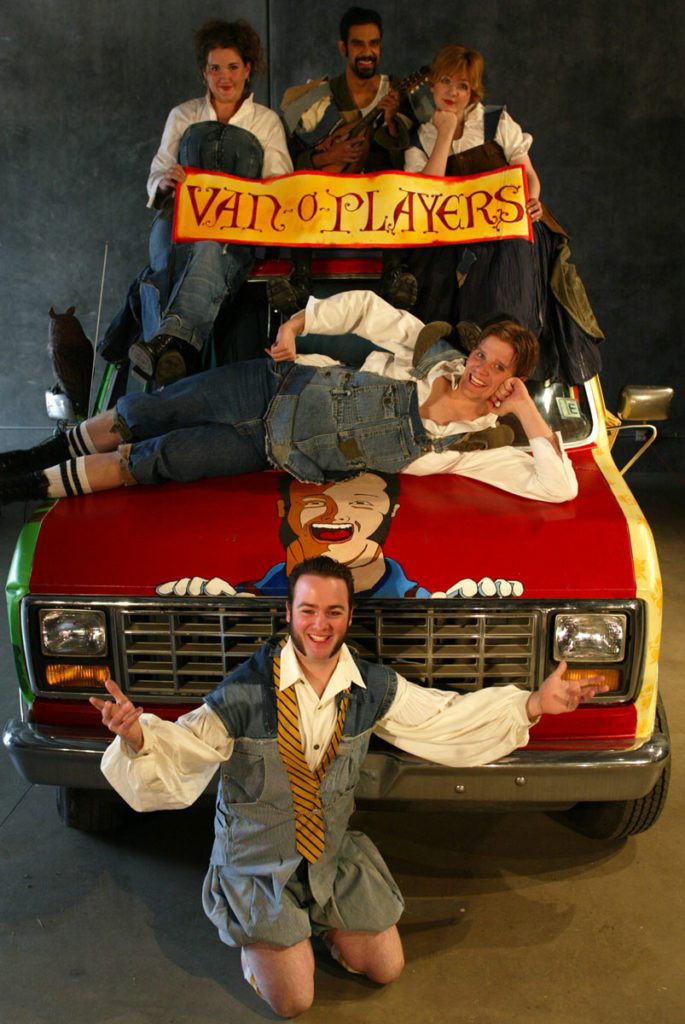Buntport’s Titus Andronicus! The Musical still kills.
Going to the theater alone is depressing, so part of my job as a reviewer involves coaxing, bribing and seducing friends and family members into accompanying me. Over the years, I’ve come to rely on these companions — wise and perspicacious people all — even when their opinions clash with mine. They provide a sorely needed outside perspective, moments of insight, a salutary reminder that not everyone sees the world in the same way that I do.
It takes some thought, figuring out who should be invited to what. So-and-so likes big musicals; someone else is drawn to British comedy; this friend is in love with language; this one admires spectacle. If a friend has seen too many clunkers in a row, I try to sweeten the pot with a production I expect to be excellent (though predicting excellence is harder than you might think). Then again, many of my friends don’t mind a bad show, because we have so much fun slicing and dicing it afterward.
It’s telling that everyone who’s ever accompanied me to Buntport wants to go again. For Titus Andronicus! The Musical — a restaging of the hilarious production the Buntporters mounted a couple of years ago — I invited Linda, who had never before visited this cavernous theater warehouse space on the outskirts of town. Within minutes of our being seated, amid the general cachinnation of the audience, I heard her low, musical peals of laughter. “They’re really clever,” she murmured.
Titus Andronicus is a Shakespeare play so awful that for centuries, many scholars refused to believe that Shakespeare had actually written it. Forced to concede the point, they scrambled for explanations. It was co-written with someone else. It’s not really that bad. It’s a parody.
The plot alone is a howler. It involves the Roman conqueror, Titus, and his captive, Tamora, Queen of the Goths. There are lots of sons — Titus’s, Tamora’s, the sons of Saturninus, himself son of the Emperor. You also get lust, hate, revenge, rape, murder, mutilation and rivers of blood. Each unbelievable plot twist seems to exist solely for the purpose of ushering in more mayhem.
In the Buntport version, five actors play all of the characters, using minimal costumes and scenery. There’s a board to one side of the stage adorned with caricatures of the actors’ faces. Beneath each face is a list of names, and above each name is a lightbulb. At the beginning of every scene, someone runs to the board and rapidly illuminates the relevant bulbs so you know which character the actor is supposed to be at that moment. Some characters, like Tamora’s sons, are represented by objects — in this case, a gas can and a radio. Evan Weissman plays only one role throughout — actually, multiple roles wrapped into one. This guy is called Someone Who Will Probably Die. Like Kenny in South Park, Weissman gets knocked off over and over again; unlike Kenny, he does it with a certain sneering élan.
In addition to the helpful character board and a second board on which the corpse score is noted in chalk, there’s a van in the middle of the space, painted to represent a house on one side and a forest on the other. This van is rolled from place to place by the actors as needed, while Brian Colonna, who plays Titus with insane energy, urges the audience to help by yelling, “Push, push.” Pretty soon it sounds as if you’re in an obstetrics ward with a horde of prospective fathers. And, yes, we do ultimately get a newborn on stage — Tamora’s son, who, because of his resemblance to her evil Moor lover, Aaron, she — Lady Macbeth-like — wants killed. (Aaron isn’t a Moor in the Buntport version; what gives away the child’s paternity is the fact that he’s inherited his father’s black mustache.)
The action is punctuated by song. At one point, Titus is convinced that he can save his two kidnapped sons by cutting off his hand. He, his brother and a third son compete for the honor of mutilation in a warbling trio. There’s also cheerful singing as Tamora instructs her sons in how to rape and mutilate Titus’s daughter Lavinia, played by Hannah Duggan.
The acting is frantically funny. Erik Edborg prances and weaves about the stage like an animated cartoon figure; Erin Rollman is a smoothly evil Tamora. No one can do silent exasperation better than Hannah Duggan: Her expression when Titus asks her to reveal the name of her assailants after the rape — she’s dripping blood and supposedly missing both hands and tongue — is priceless.
There’s no attempt to make a statement here, just a fast, effervescent evening of fun. “You’ll let me know when these guys do another production?” asked Linda as we left.
-Juliet Wittman, January 27, 2005, Westword
